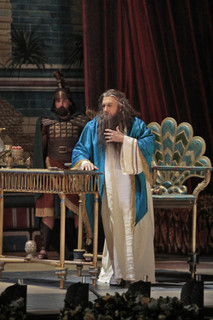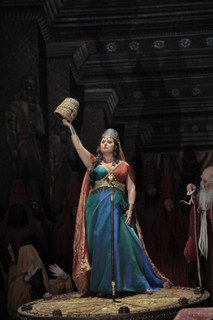|
Back
Un brindisi a Risorgimento Los Angeles
Dorothy Chandler Pavilion
10/14/2017 - & November 2, 5*, 8, 11, 19, 2017
Giuseppe Verdi: Nabucco
Plácido Domingo (Nabucco), Liudmyla Monastyrska (Abigaille), Morris Robinson (Zaccaria), Mario Chang (Ismaele), Nancy Fabiola Herrera (Fenena), Gabriel Vamvulescu (High Priest of Baal), Liv Redpath (Anna), Joshua Wheeker (Abdallo)
Los Angeles Opera Chorus, Grant Gershon (chorus director), Los Angeles Opera Orchestra, Roberto Cani (concertmaster), James Conlon (conductor)
Thaddeus Strassberger (stage director and set designer), Mattie Ullrich (costume designer), Mark McCullough (lighting designer), Austin Spangler (fight choreographer) 
P. Domingo (© Ken Howard)
Ungrateful odds were upon Giuseppe Verdi: in less than two years the Busseto-born composer suffered loss of wife and children, and was blistered by whiplash cackles towards his first melodramma giocoso, Un giorno di regno. But leaning forward two years (1840-1842) we see a resilient, resurgent Verdi, a man held “theatrical hostage” under Habsburg domination with their unrelenting repression against restoring Italian unification. Such vortex of historical content is the lynchpin in unraveling Thaddeus Strassberger’s genius. In the truest sense, M. Strassberger is a sagacious purist, designed to anticipate a remarkable occurrence. As if being suctioned like a “fly on the wall”, Thaddeus Strassberger winds us back to March 9, 1842 to bear witness to the intrigue, innuendo and incendiarism inside La Scala.
A scion of the Rossini trade, Giuseppe Verdi grabbed at new dramatic boundaries while teasing the imagination. This Nabucco is nonpareil in today’s repertoire, an apex of operatic excellence not only because of its engulfed, musical persuasion, but because of its superlative touches from Mark McCullough’s lighting and scrupulous costuming by Mattie Ullrich.
If there’s an inspirational gentleman who sallies forth in timelessness, it’s unquestionably Plácido Domingo. This homme extraordinaire doesn’t appear to be retiring anytime soon since he continues to nicely adjust from tenor to baritone without any foibles…he’s a sure bet. In yesterday’s matinee we evidence just how persuasive he can be in power and verve as the mighty (though vulnerable) King of Babylon. Importantly, his greatest moment of sensitivity lands inside “Dio di Giuda!” where he humbly collapses to the floor with magnified passion.

L. Monastyrska (© Ken Howard)
Thanks to Maestro James Conlon’s fastidious reading, we’re immobilized by Abigaille’s evil manipulations, seen through the eyes of debuting Liudmyla Monastyrska. Hailing from Kiev, this young woman is jaw-dropping. She’s nothing short of remarkable by way of finessing coloratura, exercising pliability, pinching of voice [for razor control] and dramatizing for grandiose command. Her tessitura is devoid of any hesitation which assures us as a steely, ill-fated slave-born. On equal front, LA Opera favorite Morris Robinson’s prominent baritone register is eye-catching and relentless in mesmerizing tonality. Thaddeus Strassberger hones in on Solera’s libretto, word-for-word, by painting a vitriolic Zaccaria (appropriately) and also dwelling on softer sides of his character with fashionable restraint.
Nancy Fabiola Herrera’s return to LA Opera since Carmen (2008) and Il postino (2010) finds her right in the cross hairs of Abigaille’s vengeance. This soprano voice not shy in her declamations, and the payoff resonates greatly, especially when paired up with the luster of Mario Chang’s tenor persuasions as Ismaele.
One of the greatest protagonists found inside Nabucco is the chorus itself. Grant Gershon delivers tasteful shading, blending and nuances, adding well-defined substance to an already richly-derived production. We see this production through an “Austrian lens”, not only from La Scala’s orchestra floor, but glancing at a “slice” on the other side of the proscenium arch.
For many, Nabucco’s hallmark reminiscence rests inside the plaintive “Va, pensiero.” As audience members, we’re exposed to another level of innocuous tension: Austrian royalty is watching the opera while we [the audience] witness the Hebrews’ lament on the backside of the risers (and behind a translucent scrim.) Sandwiching La Scala’s internal activities, the perspective is thought-provoking to the point of signifying what’s really at stake inside the Nabucco of 1842. Strassberger’s two-leveled drama prevails throughout: Austrian Empire vs. The Kingdom of Lombardy-Venetia and Babylon vs. Jerusalem.
There’s a much-needed message of universality and honor connected by Thaddeus Strassberger: history repeats itself. In turn, we pause with reflection upon seeing the ensuing aftermath in La Scala back in 1842. No matter the culture, no one can take away pride of one’s own country and heritage. Risorgimento carries Verdi’s message above and beyond the booted boundaries of his beloved country.
Sublime with a capital “S!”
Christie Grimstad
|